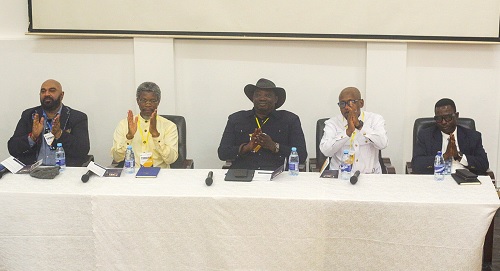Thw Ghana Communication Technology University (GCTU) has held the third edition of its Technology, Business, and Society Seminar (TEBUSS) to explore Africa’s technological and economic transformation, reinforcing the need for unity, education reform, and technological advancement.
The seminar, which took place today (Wednesday, March 26), was on the theme: "The Africa we want, The Africa we should claim."
It brought together academics, industry professionals, and policymakers to discuss Africa's technological and economic transformation.
Delivering the keynote speech, Executive Dean of the Faculty of Management Sciences at Durban University of Technology, Prof. Fulufhelo Netswera, emphasised that understanding Africa’s past was crucial in shaping the continent’s future, stating that African children must be educated about their true history to appreciate their identity and heritage.
He argued that artificial colonial borders have hindered Africa’s growth and that economic integration, like the African Continental Free Trade Area (AfCFTA), must be backed by concrete actions.
Research
Addressing the audience of students and professors, Prof. Netswera also called for African-led solutions to the continent’s challenges, urging universities to champion research and innovation in key sectors such as energy, agriculture and technology.
"We should not be importing solar panels from China when we have the capacity to produce them ourselves, we cannot continue importing technology. We have the capacity to produce.
“Africa must lead in research, manufacturing, and industrialisation," he said, emphasising the need for skills development in Africa’s higher education institutions.
He further underscored the political and economic dimensions of technological advancement.
"Every academic and student must be rooted in political and economic history," he said, explaining that global economic dynamics shape Africa’s opportunities and challenges.
Academia-industry partnerships
The Vice-Chancellor of GCTU, Professor Emmanuel Ohene Afoakwa, also emphasised the importance of academia-industry partnerships in driving Africa’s development.
He mentioned that the future of Africa's growth lies in strong collaborations between universities, businesses and governments.
Prof. Afoakwa further highlighted the partnership between GCTU and Durban University of Technology (DUT), which has resulted in 10 GCTU faculty members receiving full PhD scholarships at DUT.
"This partnership is not just about academics but about shaping a new Africa led by innovation and self-sufficiency," he said.
Leader of the ICT and Society (ICTAS) Niche Research Group and the Vice-Chair of Space Science Research Group at the Durban University of Technology, Prof. O. Olugbara, challenged African universities to rethink their educational models.
"A university’s goal should not just be to train students for industry but to develop problem-solvers who can create jobs," he said.
He also advocated a shift from knowledge-based learning to skill-based education that equips graduates with practical expertise.

